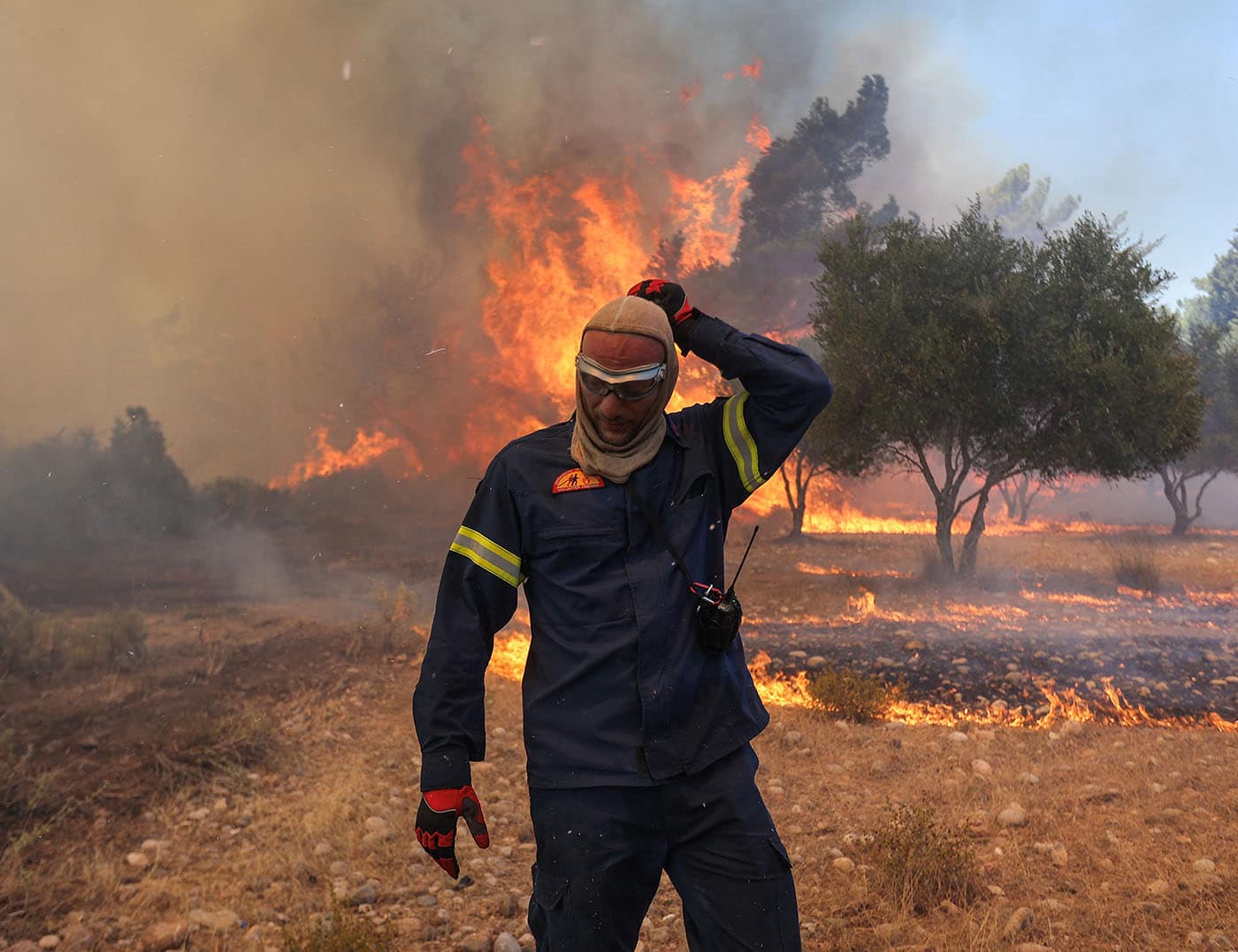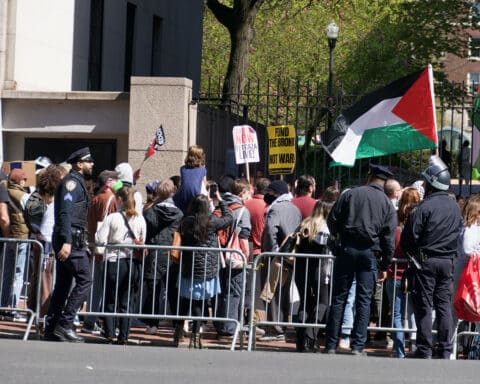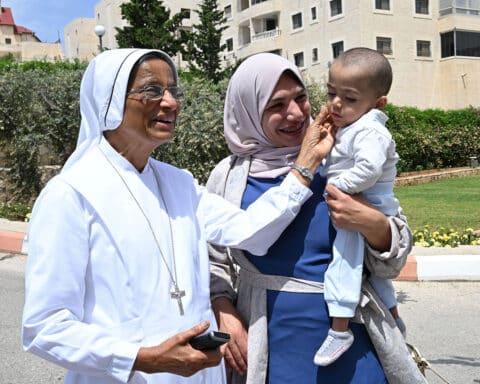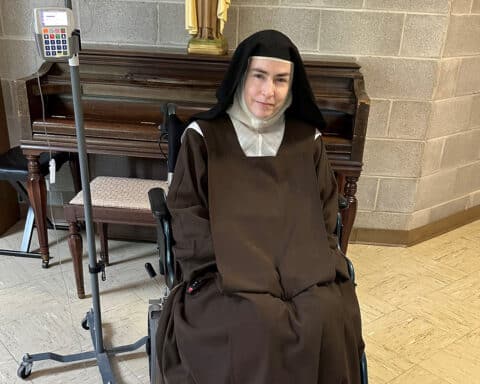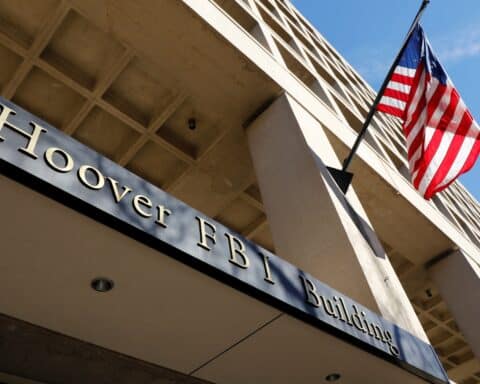(OSV News) — Catholics in Greece have called for lessons to be learned after a wave of fires devastated parts of the country amid highest summer temperatures for half a century.
“We still don’t know how many church communities have been affected, as hotels burned and people were evacuated,” said Archbishop Josif Printezis of Naxos, Andros, Tinos and Mykonos, secretary-general of Greece’s Catholic bishops’ conference.
“But the pope has talked many times about how we all need to collaborate in reversing climate change. Although it’s been hard in Greece to tell whether these latest fires are directly connected with this, we need to start reflecting properly and respecting our common home.”
The Tinos-based archbishop spoke with OSV News as people continued fleeing their homes on Rhodes and Corfu, as well as in mainland areas, and as thousands of tourists remained stranded after having holidays suddenly curtailed.
Meanwhile, a Franciscan priest ministering on Rhodes said Greece’s wildfire problem was worsening, and he echoed calls for future dangers to be taken more seriously.
“Villages have been completely razed — and because it’s so hot and dry, with high winds blowing, the fires are still raging,” Father Luke Gregory, British-born vicar-general of the Rhodes archdiocese, told OSV News. “Pope Francis has been prophesying about this for years, and we just haven’t listened. World leaders and the fossil fuel business have got to start taking note. The rest of us must wake up to this serious situation and think about our common home, not just about ourselves.”
Pope Francis in his July 28 telegram to Bishop Petros Stefànou, president of the Greek Catholic bishops’ conference, said that he is “deeply concerned by the threat to life and damage caused by the widespread wildfires” in various parts of Greece.
“His Holiness assures all those affected of his spiritual closeness,” and prays God “will bless the efforts of the firefighters and other emergency personnel to combat this hazardous situation,” the telegram signed by Vatican’s Secretary of State, Cardinal Pietro Parolin said.
Echoing concerns of local clergy, Pope Francis stressed it is his “hope that the risks to our common home, exacerbated by the present climate crisis, will spur all people to renew their efforts to care for the gift of creation, for the sake of future generations.”
Hundreds of fires were reported across Greece from mid-July, mostly blamed on arson and human negligence, under heatwave conditions with high-velocity winds.
On Rhodes, up to 300 firefighters were deployed, backed by dozens of trucks and fire-fighting aircraft, as 20,000 people were moved to safer locations in Greece’s largest-ever fire evacuation.
An average of 50 new wildfires have broken out daily since mid-July in Greece, according to government spokesman Pavlos Marinakis. Over the weekend, 64 new blazes were recorded, British newspaper the Independent reported.
Addressing the Athens parliament, prime minister Kyriakos Mitsotakis, said Greece was “at war with fire.”
With other parts of the Mediterranean also facing fires and record temperatures, the U.N. Secretary-General, António Guterres, warned July 27 the world was entering an “era of global boiling” and also demanded radical climate action.
The rector of Corfu’s Sts. James and Christopher parish, Father Marios Rigos, told OSV News July 28 at least 16 districts had been evacuated on the island, with many people taken to safety by boat in its main towns, adding that fire now threatened the tourist hubs of Sinies, Loutses and Barbati.
On Rhodes, Father Gregory said 30,000 people were currently “wandering about with nowhere to go” after being forced to leave their hotels, adding that he was surprised tourists were still arriving at the island’s airport.
The priest said the island’s main petrol-operated power plant had been closed down, cutting electricity and internet connections, and said he had now opened his parish hall, theater and gardens to homeless holiday-makers.
“People were told to grab their belongings and then leave them on the beach so they could get on the evacuation boats — so they’ve mostly arrived here with only their clothes,” the Franciscan told OSV News from Rhodes Town.
“Many had to run, very frightened, to escape a huge wall of fire — and although local Greeks have made great efforts, offering shelter and food, tourists are still flying in with nowhere to stay,” he said.
Greece’s Civil Protection ministry said July 27 the fire risk remained “extremely high,” with winds gaining strength and temperatures set to rise to the mid-40s Celsius.
A Greek air force water-dropping plane crashed while diving into a wildfire in the island of Evia on Tuesday July 25, killing both pilots, aged 34 and 27.
“They offered their lives to save lives,” prime minister Mitsotakis said of the pilots.
Requiem services were held for the pilots, Christos Moulas and Periklis Stefanidis, as the Orthodox Ecumenical Patriarch, Bartholomew I, whose spiritual jurisdiction extends to eastern Greece, joined others in pledging prayers in a letter to church leaders.
In a July 27 message, Greece’s Orthodox Sacred Association of Clergy said rescuing lives remained the priority for those fighting fires “with patriotism and solidarity,” but also expressed sadness at the “destruction of fauna and flora, which are integral and necessary parts of creation.”
In his OSV News interview, Father Gregory said Orthodox priests had been active “guiding and calming” local villagers on Rhodes, while stranded Catholics had attended Mass and lit candles at the St. Francis of Assisi and Our Lady of Victory churches.
He added that the island’s small parish was already helping migrants and refugees, and providing weekly food parcels to 700 people, and said he hoped tourists would be offered compensation for their “awful experiences.”
On Corfu, Father Rigos praised the “heroic day-and-night efforts” of firefighters and civil guard and Red Cross volunteers, adding that the Catholic Church’s Caritas had promised help to the regional governor, Rodi Kratsa, as soon as “immediate needs” were known.
“Aircraft are still fighting fires non-stop on two active fronts here, while volunteers arrive with water tanks in response to residents’ appeals,” the Greek priest said. “Although we don’t yet know of any damage to Catholic homes or parish buildings, strong winds continue to fan the flames, causing great fear, while many of our British, Polish and Italian parishioners and visitors have left.”
The Catholic Church’s six dioceses and archdioceses claim around 200,000 members, less than 2% of the population of Greece, a NATO and European Union member. The predominant Orthodox church, headed by 85-year-old Archbishop Ieronymos II, claims the nominal loyalty of 95%.
Archbishop Printezis said the Catholic Church’s aid workers would be “standing by in readiness” when the fires were doused.
“Caritas doesn’t want to intervene or get in the way — but we’ll be in touch with those in charge once the full damage is known,” the bishops’ conference secretary-general said.
“The authorities know and respect the work of Caritas, and once the firefighters have done their job, we’ll see what’s needed for those who’ve lost their homes.”

